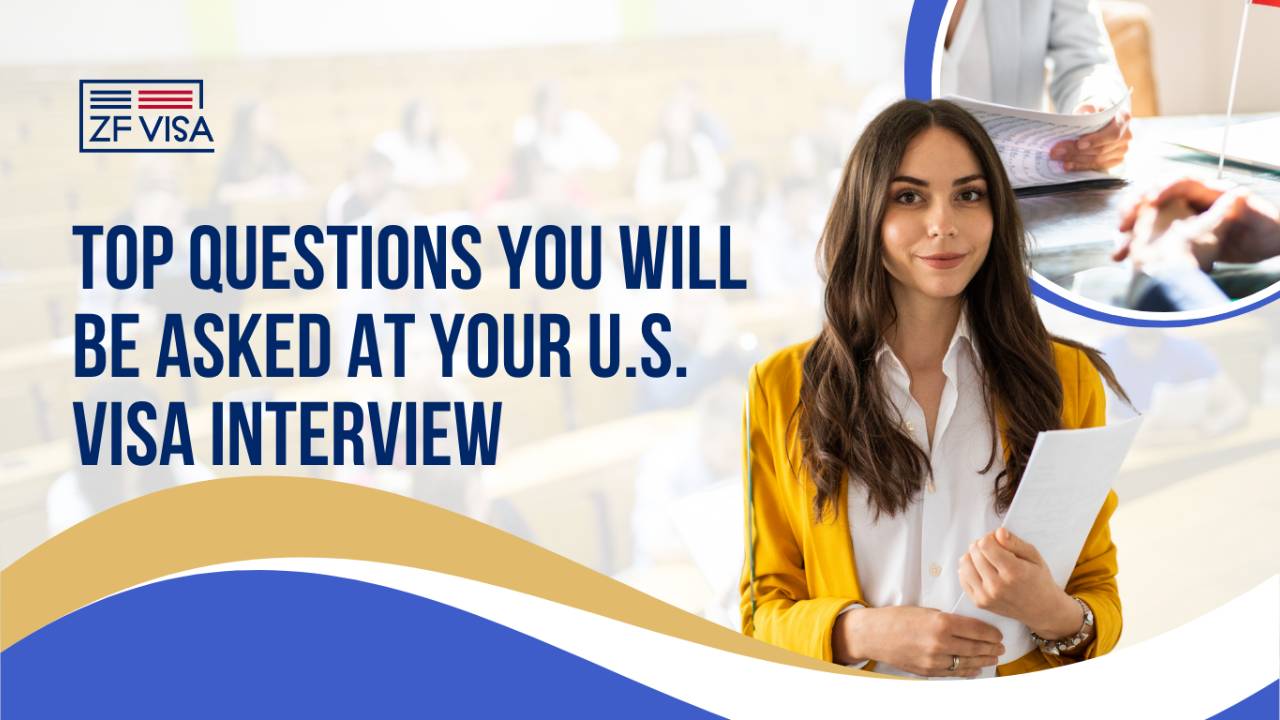
Top Questions you will be asked at your U.S. Visa Interview
Written by Mandy and Travis Feuerbacher, Former Visa Officers & Immigration Attorneys
Many applicants feel nervous because they don’t know what questions the visa officer will ask. Being unprepared can lead to nervousness, awkward pauses and, unfortunately, sometimes a visa refusal.
Below are some of the most common questions visa officers ask — and why they ask them.
Why Are These Questions Important? 🎓
Most non-immigrant U.S. visas, including F-1 Student Visas and B1/B2 Visitor Visas – generally require applicants to demonstrate:
- That they are planning activities which are allowed under the visa they seek (e.g., that they are planning to attend a conference - but not to work - on a B1/B2 Visitor Visa, or that they intend to enroll in a full course load and attend class on an F-1 Student Visa);
- That they can afford their trip – whether it’s a holiday or a multi-year educational program; and
- That they will leave the United States when their trip or educational program concludes.
Visa Officers structure their questions to evaluate applicants against these considerations to help reach a decision. While each interview is unique, there are some common interview questions you might expect.
Common Questions to Expect ✈️
1️. Why are you going to the U.S.?
This is often the first question for many B1/B2 Visitor Visa applications. This is your opportunity to clarify your primary reason for your planned trip. Remember that your first answer sets the tone for the entire interview.
2. What school will you attend in the U.S. / What will you study in the U.S.?
This is often the first question for many F-1 Student Visa applications. This is your opportunity to introduce your educational plans, including your financial arrangements and plans after graduation.
3. Do you have any family in the U.S.?
Officers often ask this question as they are evaluating whether you are likely to leave the United States after your trip or educational program concludes. Having family in the United States will not automatically disqualify you from obtaining a visa, but you must be honest. Lying about this or trying to conceal these details can lead to a denial or even more serious consequences.
4. How long will you stay?
As they consider your travel plans, Visa Officers often want to know exactly how long you plan to stay in the United States. Be sure you provide an honest response, as U.S. immigration officials might later compare what you said at your interview in future interactions, such as when you arrive at the airport in the United States.
5. What do you do for work?
This question helps the Visa Officer evaluate your connection to your home country and your financial situation. A stable job is a strong tie that makes it more likely you’ll return after your visit, but remember that honesty is key. Don’t inflate your salary or your tenure with your current job.
6. What has changed since your last interview?
This is a common question for applicants who have been denied before. Instead of trying to explain why you were previously refused, focus on positive developments in your life since your last interview.

1️. Will I get all these questions in this order?
Almost certainly not. Each interview is unique, and officers rarely ask the same questions. They may focus on specific details in your application as they evaluate your qualifications.
2️. How should I answer these questions?
Be sure to answer the Visa Officer’s question, but provide as much detail and context as possible. Remember that it’s your job to demonstrate your qualifications, so take each question as an opportunity to convey why you should be approved.
3️. What happens if I forget an answer?
Stay calm. It’s better to admit you’re not sure than to guess or make something up.
4️. Is it OK to say I don’t have family in the U.S. if I do?
No. Never lie. Officers likely already know about your U.S. relatives.
5️. How can I practice?
Review your plans, documents, and past applications, and review our expert guidance at www.zfvisaguides.com, where we provide examples of good and bad interviews with a proven formula for effective communication at your interview.
Final Thoughts ✅
Knowing these common questions — and considering how you will respond — will help you feel more confident and avoid surprises at your interview.
Take the Next Step Towards Visa Approval
🎥 Watch: Top Questions you will be asked at your U.S. Visa Interview
📩 Download: Your free step-by-step visa preparation guides, trusted by thousands of successful applicants. (Free F-1 Visa Guide & Free B-1/B2 Visa Guide)
🧳 Prepare: Enroll in our comprehensive visa interview course to boost your confidence and readiness.
Your approval isn’t based on luck - it’s based on preparation. Let’s make it happen!
Legal Note: The information provided does not constitute legal advice or a guarantee of visa approval. For specific legal guidance, contact ZF Visa & Immigration at [email protected].
Stay connected with news and updates!
Join our mailing list to receive the latest news and updates from our team.
We hate SPAM. We will never sell your information, for any reason.


